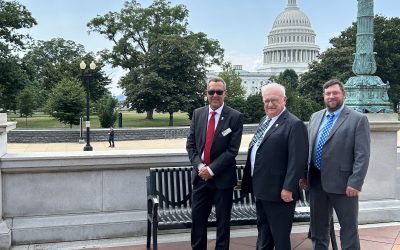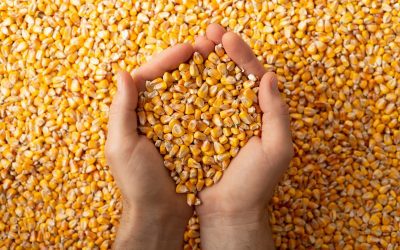First generation farmer becomes an advocate for agriculture
Posted: June 1, 2022
Category:
Indiana Corn and Soybean Post - Spring 2022, ISA, News
Koehne, of Greensburg, had a steep learning curve – both good and bad – in becoming a first-generation farmer. While growing up, his dad was a carpenter and owned his own construction business. Koehne helped some, but he discovered “hammering nails” wasn’t for him. He did enjoy helping neighbors bale hay and straw.
“There weren’t many farm kids at my Catholic grade school; when I got to high school, I joined FFA,” Koehne said. “Through FFA I made some friends and occasionally helped them on their family farms. While in high school, I had a job in the co-op program where I went to school half day and worked half day. I got a job with a family who raised dairy cattle and hogs, and I really enjoyed being with them. It was a real inspiration and eye-opener how the family worked together, brought up their kids, and lived the family farming lifestyle.”
Following high school, Koehne attended the University of Northwestern Ohio for its auto and diesel mechanic program. His industrious mindset enabled him to work for an area hog farmer to help him pay for school, working with hogs during the day and attending school at night.
Farming was on the horizon, though. In 1992, while working for a trucking company after returning home, Koehne talked to a neighbor whose 78-acre farm became available for rent. When asked if he could rent it, the neighbor said “sure.” Koehne was on his way. He’s grateful he’s still working with that landlord today.
“I knew I had to come up with money to get started,” he explained. “My off-farm job paid for my new habit of farming. Buying only the bare minimum, I found an old tractor and bought an old corn planter and a disc at a sale.”
A ‘family’ farm
Koehne is thankful his parents were supportive of his new passion. Later he rented another neighbor’s ground on shares. One of his off-farm jobs, while building his operation, was at an ag dealership working on tractors and equipment including their pulling tractors.

“I did a lot of work for one farm family who said they’d like to have an on-farm mechanic,” Koehne recollected. “I went to work for this family as a mechanic in their shop, and I eventually met my future wife, Jill, there.”
Mike and Jill married in 1997 and endeavored to keep growing their own farm. They bought a trucking company that included semi-trucks and livestock trailers and built their own livestock trucking company. Growing that to five trucks at one time, they hauled livestock “in 38 of the lower 48 states,” he said.
While making decisions about his family, Koehne decided to quit driving a truck full time in 2006. He and Jill decided to focus on growing the farm and had the opportunity to purchase a farm drainage business. The farmstead they purchased in 2000 was not in good shape, he said.
“We eventually tore everything down and started from scratch,” Koehne explained. “At the time, we had a 2-yearold and another on the way. We built our house on the farm in 2002, bought used grain bins and built them on our site to keep costs down and not borrow too much money.”
Koehne said a big key for them is to keep debt down. “If we didn’t have the money, we didn’t buy it, or we had to figure out how it would pay for itself.”
Mike and Jill have four children. Rebecca, 23, manages a grain elevator. Luke, 21, works on the farm with his dad. Logan, 19, is majoring in pre-med and plays college football. Caroline, 16, is a sophomore in high school.
Related farm businesses
Koehne bought a local tile and drainage business in 2006. He worked alongside the owner with the equipment purchased; then started updating on his own.
“Drainage tile is a money maker for farmers,” Koehne said. “Yield monitors are my biggest tile salesmen because we can see the benefits of the tile in the yield difference. In 2008, we started mapping with GPS. In 2010, we had full machine controls with GPS guidance. It’s amazing to see where tile is and isn’t in a field. In 2018, I purchased a new wheel machine, and I still prefer a wheel machine today.
“I do my own layouts and design drainage systems. I am certified Technical Service Provider with NRCS to do tile layout and design. The original drainage owner, who owned his own kiln to make clay tile, is still a valued consultant for me. Though my training was hands-on, oldschool stuff, I could use it today if I had to. Drainage is not easy work; it takes finesse and knowledge.”
He purchased a commercial plow in 2021 “because that’s the trajectory in the industry.”
Having his son, Luke, working alongside him is another learning curve, but Koehne is happy to have him driving a truck, ditching and farming. “It can be a chore to be dad and boss, but he sees I still rely on and respect the older farmers who I trust and talk with often.”

Luke is also an able hand for his dad as they commit to doing 95 percent of their own mechanic work. They run a lot of old equipment because they can work on it, and it saves time and money. They currently farm approximately 900 no-till acres, with 240 being rented. Their family operation, Kingdom Farms, grows all specialty crops.
“With specialty crops it’s easier being a smaller farm to keep them separate,” Koehne explained. “It’s added value for smaller farmers. We grow regular non-GMO corn for a Kentucky bourbon distillery. We also work with a broker for a Japanese dry milling facility where our hard endo corn travels by barge. Our Clear Highland food grade beans go to Japan and Taiwan by container. This works for us as we put foresight into our grains and keep everything very clean.” He noted there was no Roundup available when he began farming. Last year was his first year to plant Roundup Plenish High Oleic beans. “We made that decision to control the weeds. In the last 20 years, there’ve been similar new products for corn but not for beans.”
Advocating for farmers
Koehne’s love of learning heightened seven years ago upon receiving a postcard from the Indiana Soybean Alliance inviting him to a legislative breakfast at the Indiana Statehouse. During the event, he visited with a former trucking customer, Jim Douglas, who encouraged Koehne to run for ISA’s board. Koehne didn’t think he had time, but Jill encouraged him.
“I thought it might be interesting, and I like to learn new stuff. I ran for the board, was elected in 2016, and it’s one of the best experiences I’ve ever had,” he admitted.
Now the vice chair of the board, Koehne said, “you learn so much about what goes on after the elevator. You don’t often think about what the checkoff does for you as a producer, how it impacts your farm in the long run. I’ve served as chair of the Membership and Policy Committee for two years. Being an advocate for American and Indiana farmers builds relationships with senators and representatives. They recognize me now when I visit D.C. or see them at local events. Having a voice does make a difference.”

A trip with fellow board members to Vietnam was also eye opening. Talking to an end user of soybeans, seeing how they work, and hearing what they want and need or listening to complaints, gave Koehne a fresh perspective on how encompassing ISA’s work is.

“Hopefully we can continue to build relationships with Vietnam and increase our business into the future,” he said. “The free enterprise we have in the U.S. is taken for granted. They really enjoyed learning from us, and we enjoyed learning from them.”
Koehne also serves on the Soy Transportation Coalition board. STC studies infrastructure and transportation issues for agriculture. “Because producers ship grain by truck, rail, barge and container, we must keep our modes of transportation in good working order,” he said. “This makes our products worth more, and more efficient for our exporters who are buying them.”

When Koehne and fellow STC board members visited Mexico in December 2018, they found its port system needing a dredging project similar to the ongoing Mississippi River dredging. “They use smaller ships because they can’t get large ships in with the current water depth,” he said. “Getting larger ships in helps our shipping costs and farmer’s bottom lines.”
Koehne’s commitments in ag organizations continues to widen and enhance his learning curve. He advises other farmers to do the same. Koehne was recently elected to American Soybean Association and is serving his first year on the board. He is honored to serve Indiana farmers on this board and excited to see where this will take him.
“I do encourage people to get involved on the ISA board,” he said. “We need our voices heard and share about the vital research that the soybean checkoff provides. You only get out of it what you put into it. We work hard as farm families to produce a quality product for the consumer. There’s a lot of sacrifice, but it’s a great lifestyle.”



